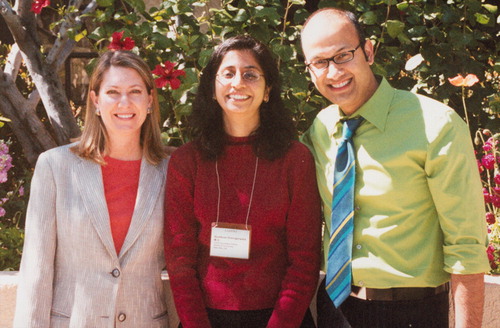Training Directors Can Ease IMGs' Cultural Transition
Residency training can be a challenging time for most trainees in the United States, but especially for non-U.S. international medical graduates (IMGs), who often must adapt to a new culture and language as they learn to practice psychiatry. Training directors, however, can anticipate these challenges and take steps so that IMG residents can have successful training experiences.
This was the message delivered to residency training directors at the annual meeting of the American Association of Directors of Psychiatric Residency Training in Tucson, Ariz., in March.
Quddusa Doongerwala, M.D., a fellow in child psychiatry at Stanford University School of Medicine, observed that “understanding the nuances of spoken English in America is particularly important in psychiatry training.”

It can also be a challenge for residents in general—but IMGs in particular—with regard to adolescent slang. As an IMG with a good command of the English language, Doongerwala was stumped when a young female patient informed her that she once dressed like a “Valley girl.”
Doongerwala asked the patient to explain what she meant by the term.“ She was happy to explain,” she noted, “and our interaction helped to build the therapeutic alliance.”
Doongerwala also pointed out that some IMG residents may be coping with stress and anxiety related to their immigration. She quoted psychiatrist Yoosuf A. Haveliwala, M.D., who in 1979 wrote in Psychiatric Quarterly that “the very experience of undergoing the acculturation process with its feelings of loneliness, rejection, misunderstanding, and conflict can help the foreign-born psychiatrist to understand and empathize with... patients whose psychiatric problems often lead them to feel alien in their own culture.”
Doongerwala advised training directors to recognize that IMG residents may be missing their country of origin and having difficulty adapting to a new culture and to encourage IMG residents to get to know the other IMGs in their training program.
While a trainee at the University of Texas-Houston, she had many IMG colleagues. “It was helpful for all of us to discuss our different cultures and the various challenges we faced as residents,” she noted.
At Stanford, Doongerwala participates in “culture seminars,” which focus on clinical approaches to dealing with patients from a variety of cultures and also build on self-revelation. “We each talk about our own cultural backgrounds and about how we were raised within those cultures,” she said.
Doongerwala endorsed the benefits of one-to-one supervision for IMG residents learning to practice psychiatry and pointed out that “having a supervisor from one's own country of origin might not be as beneficial as having a supervisor from the host country in the process of acculturation.”
According to Shashank Joshi, M.D., director of training in child and adolescent psychiatry at Stanford University School of Medicine, many IMG trainees benefit from a task-oriented approach to learning “coupled with a trusting, empathic relationship” with a culturally informed faculty member who can serve as a mentor for the resident.
Joshi discussed work by Nyapati Rao, M.D., who has written and lectured about the role of IMGs in psychiatry and has pointed out that mentorship“ is a vehicle for acculturation” for IMGs and helps them focus on a career path.
It is important for training directors to implement cross-cultural training for U.S. medical graduates as well as for IMGs, Joshi said, with videos, scenes from television and film, or literary readings, in addition to clinical vignettes involving various subcultures.
“Any formal didactic course is best started with a working definition of the complex construct we call culture,” Joshi said, followed by a discussion with all residents about their cultural backgrounds.
One of the best ways for IMG residents to learn to interact with patients from different cultures involves videotaping the sessions and then critiquing them with supervisors, according to Cynthia Santos, M.D., who is director of training in child and adolescent psychiatry at the University of Texas Health Sciences Center in Houston.
Santos organizes psychiatry training clinics in Houston-area schools. On these rotations, “the resident has to fit in on someone else's turf,” which can be difficult for some IMG residents who are accustomed to the idea that “the physician is always in charge,” she said. For instance, the resident may assume the role of consultant to a preschool and work on a team run by a psychologist.
“Sometimes part of the job is just to be helpful to the teachers,” Santos said, which “could require the resident to pass out milk to the kids at break times. Passing out milk may not be something that would be expected of a physician where they are from.”
In Santos's program, residents have participated in a variety of activities designed to help them learn about different cultures, such as a family seminar in which residents learn about normal child and adolescent development and how family systems work in different cultures.
“This gives residents a chance to talk about their own families and what they are like,” she said.
She noted that some of her residents from other countries have commented that adolescence in the United States is not like adolescence in some other parts of the world.
“There is an expectation that American adolescents are more rebellious and focused on independence,” she said.
As part of the seminar, residents explore their own heritage by constructing a family tree. There are also a cultural competence seminar and resident-initiated activities, such as a journal club in which residents learn about one another's religions.
IMG residents “bring new perspectives to residency training,” Santos remarked. “Their presence is crucial to the success of any residency training program.” ▪



